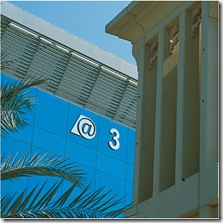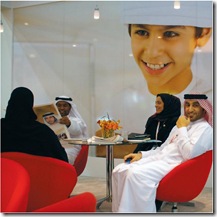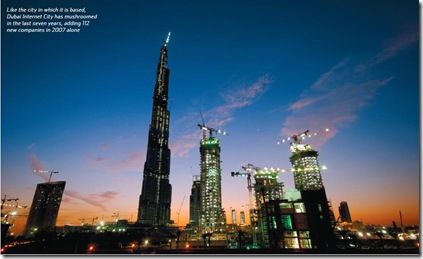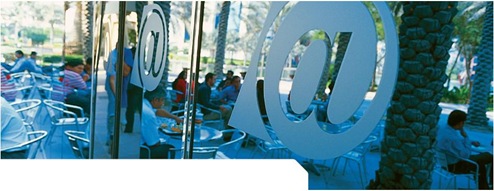Last October, Dubai Internet City celebrated its seventh anniversary of establishment, and confirmed its position as the leading managed ICT hub in the region. Malek Al Malek was appointed executive director of the technology cluster earlier this year, and spoke to Comm. about DIC’s progress to date as well as its exciting future prospects

Dubai Internet City is able to process applications for licensing new companies in the hub in a matter of a few days
Turning off Dubai’s busy Sheikh Zayed Road and encountering the first round-about within the Dubai Internet City (DIC) compound, one would be mistaken for believing the physical infrastructure has been in place for at least a decade. This is not in fact the case, and like much of the bustling city in which it exists, DIC’s expansion in a few short years has been nothing short of tremendous.
Seven-and-a-half years on, the ICT hub now comprises 1,200 companies, many of which rank within the Fortune 500 list of global corporations. The growth in the number of companies being attracted to establish a representation in the DIC has remained strong over the period of its existence, averaging 25 per cent growth annually and there appears to be no reason this robust expansion will be curtailed anytime soon.
In 2007, for example, DIC attracted 112 new companies to the cluster, including telecoms and Internet giants BT and Google, respectively.
“Partnership is a key component of the relationship that is established between the DIC and representative companies hosted within the cluster,” comments Malek Al Malek, DIC’s executive director. “What has made us successful is a combination of the infrastructure we have in place as well as the guidance we offer in helping organisations establish their presence in the freezone, the country and beyond.”
Al Malek’s own path to the leadership position at DIC mirrors the development path of the cluster itself, with his having joined DIC in 2002, shortly after its establishment, as partner relations manager. He was elevated to the position of director of partner relations in 2005, and given his long exposure to the process of establishing and fostering strong working relationships with the cluster’s many tenants, Al Malek is well positioned to perpetuate the success the DIC has so far enjoyed.
“The rejection rate for applicants wanting to establish an office in DIC is very low,” Al Malek reveals. “This is not because we have low standards. It is in fact the opposite. We have very high standards in place, but we also offer applicants and potential applicants such detailed advice and guidance that should they meet the criteria as detailed in the application process, acceptance of the application is virtually assured.”
Given the presence of leading global ICT companies such as Microsoft, IBM, HP, Intel and Siemens, it is clear that the pedigree of the organisations present in DIC is of such a calibre as to inspire other, smaller companies to look to participate in the support and facilities offered by the cluster as well. DIC thus has a programme in place catering to the needs of such organisations, and is facilitated through firststeps@DIC

Dubai Internet City participated at MECOM 2008, where it reinforced its commitment to remaining a pre-eminent ICT cluster
The UAE’s chart-topping mobile penetration rate, which has been estimated at in excess of 120 per cent in certain quarters, has drawn a lot of attention to the level of growth and dynamism found in the communications sector. While not as frequently reported, but also worthy of mention, is the scope and development of the Internet in the country and the establishment of Internet Protocol as the basis of Next Generation Networks.
A survey by Amman-based Arab Advisors Group late last year revealed substantial adoption of e-commerce in the affluent and booming UAE economy. Fifty one-point-two per cent of Internet users interviewed in the UAE reported purchasing products and services online and through their mobile handsets over the 12 months to end-August 2007. Based on the survey findings, the Arab Advisors Group estimated e-commerce users in the UAE exceeded 1.16 million consumers who spent over AED4.2 billion (US$1.15 billion) in the 12 months to end-August.
“The booming economy of the UAE, its burgeoning population and wide adoption of the Internet, provide an ideal context for a thriving e-commerce scene. Our survey of Internet users in the UAE revealed a massive size for B2C e-commerce in the country.
This presents opportunities for global and regionale-commerce players to tap into this growing market,” commented Jawad Abbassi, founder and general manager of Arab Advisors Group.
“The majority of UAE e-commerce users make their payments through credit cards: 83.8 per cent of e-commerce users reported using credit cards as their e-commerce method of payment. Following credit cards, 31.7 per cent of e-commerce users reported using bank account transfers for their payments,” stated Hussam Barhoush, Arab Advisors research analyst.

Like the city in which it is based, Dubai Internet City has mushroomed in the
last seven years, adding 112 new companies in 2007 alone
Given the level of human and intellectual capital that resides within many of the companies that operate out of DIC, the UAE government has a clear policy in ensuring a level of skills and knowledge transfer occurs and that the economy of the country benefits from the presence of hi-tech organisations in the cluster.
“We have a mandate of creating a knowledge-based society in the UAE,” says Al Malek. “Engaging with companies based in DIC fosters this goal and again we come back to this word ‘partnership’ in terms of fostering the platform for the creation of the knowledge-based
society in the UAE.”
Given the identification of the Internet by governments across emerging markets as a key tool in helping narrow the digital divide, the establishment of smart cities and technology freezones have been on the rise.
In the Middle East and north Africa region, this is particularly true, with facilities such as Cairo’s Smart Village (see box: Smart Villages Company) attracting an admiral list of ICT and financial institution tenants including the country’s three mobile operators – Mobinil, Vodafone and Etisalat, a number of strategic government ministries, Microsoft Egypt, Arab Bank and EFG Hermes.
However, Al Malek does not consider the establishment of technology hubs in other parts of the region as a competitive threat to DIC, believing instead that Dubai enjoys a number of advantages that are likely to ensure its ongoing strategic importance.
“Dubai’s geographic importance is clearly an advantage, standing as it does at the crossroads of a number of geographic regions,” Al Malek says. “Combined with that is the level of communications infrastructure that is available in DIC, which was originally deployed by TECOM as the communications provider in Dubai’s freezones and which is now owned and operated by the country’s second licensed operator, du.”
Recent media reports in the UAE have suggested the move earlier this year by du to begin blocking third-party provided VoIP services may have a negative impact on the operational activities of companies in DIC and other economic clusters. The move is in line with the Telecommunications Regulatory Authority’s policy to restrict thirdparty provision of VoIP services in the UAE, and in April du came further in line with the regulator’s guidelines by blocking access to Internet sites the operator deemed to be in violation of the country’s laws or cultural norms.
Al Malek does not believe these developments have, or at any time, will constitute a hindrance to the business activities of companies operating in DIC. Driving efficiencies remains the order of the day in DIC, with approvals of companies’ applications achievable in a matter of days, and the process from making the initial application to becoming a DIC-based company through to moving into premises, is able to be completed in a matter of weeks.

About Dubai Internet City
Dubai Internet City (DIC) is a strategic base for companies targeting emerging markets in a vast region extending from the Middle East to the Indian subcontinent and Africa to the CIS countries, covering two billion people with a GDP of US$6.7 trillion.
DIC offers both 100 per cent tax exemption and 100 per cent business ownership. firststeps@DIC is a unique facility within Dubai Internet City that allows companies to lease short term office space while exploring business and market opportunities. Specifically designed for ICT companies that wish to operate from Dubai to conduct feasibility studies, evaluate future potential, collaborate on joint ventures and/or scout for new business in the region, this facility eliminates the need for long term investment in large office spaces, until they are fully ready to do so.
Acting as an exclusive business centre, firststeps@ DIC has a business oriented environment that allows new companies to create opportunities and also, to collaborate with others in the community. Many established companies and entrepreneurial ventures from around the world have leveraged firststeps@DIC to establish a foothold in the market, and then gone on to establish larger permanent offices.
Options
Companies can choose to lease space either for two to three months or for a year, during which period they can test the viability of their business plans before scaling up to fully-fledged operations.
With trade licence:
- One year
- Fully operational as branch or foreign company or FZ-LLC
- Scouting/ market analysis
Without trade licence:
- Two to three months
- Scouting/ market analysis
Benefits
firststeps@DIC offers ready-to-go, fully serviced offices with the latest infrastructure and a package of services including all administrative procedures involved in starting up. Companies can also take advantage of office support services including access to reception and office services, IP telephony and messaging services, collection and distribution of incoming mail, and meeting and conference facilities with presentation equipment.
All licensing and visa formalities are looked after by the firststeps@DIC team, who can also assist with relocation and settling-in support, including hotel or residential arrangements and translation services. firststeps@DIC also introduces new companies to networking within the community, placing them in an ideal position to tap into a host of potential business and business development opportunities.
Facilities
Companies joining firststeps@ DIC are offered choices in the size and location of private office spaces known as executive offices, each with access to the following facilities:
- Intelligent workspace, fully integrated high-end office solutions, Internet connectivity, IP telephony, network printers straight to the desktop, and office support
- Central reception area, collection and distribution of mail, meeting and conference rooms, and central equipment room
- Pantry with refreshments
- Regional research
Services at glance
- 24 hour security, and accommodation assistance
- Additional fax/modem/ analogue line, airport pickup, business address, business catering, business cards, call answering services
- Car rentals, central reception and waiting area
- Courier service, daily office cleaning
- Fax transmission (international), hotel booking and travel arrangements
- Internet connection, IP phone installation and maintenance
- Leisure and entertainment guide, and newspapers
- Office supplies and stationery, and parking spaces
- Photocopying, and postal service
- Programming, secretarial services, temporary driving licence, trade licence, and visit/residence visa
Optional services
- Meeting rooms, flip charts
- Projector, fax transmission mobile phone connections, and computer rentals.
Smart Villages Company
Smart Villages Company was founded in 2001 to lead and foster a branded chain of technology and business parks on the local and regional level.
Smart Village Cairo launched in 2003 as the first fully operational Technology and Business Park in Egypt. It accommodates multinational and local telecommunications and information technology companies, financial institutions and banks, together with governmental authorities on three million square metres in the west of Cairo. The mix of business services boosts the competitiveness and profitability of enterprises taking advantage of a fibre optic network, multi-source power supply, district cooling and heating redundant network plant.
Further amenities include: property management and maintenance, event management, and transportation services on a 24/7 basis. Complementary community and business services are available in the Smart Village Conference Hall, Smart Village Club, Smart Nursery, Smart School, postal and parcel services, travel agency, signboards production, copy centre, graphic and printing agency and the upcoming Smart Village Business Hotel. Currently, 12,000 professionals run the operations of more than 100 companies and are expected to reach 80,000 by the end of 2014. Since 2006, further ventures have been under development including Smart Village Cairo Financial District, Smart Village Damietta Business and Logistics Park and Smart Villages Company Consultancy Services, which offers advice on the local incentives to franchise the smart village model in different countries.
Source: Smart Village Company





0 comments ↓
There are no comments yet...Kick things off by filling out the form below.
Leave a Comment